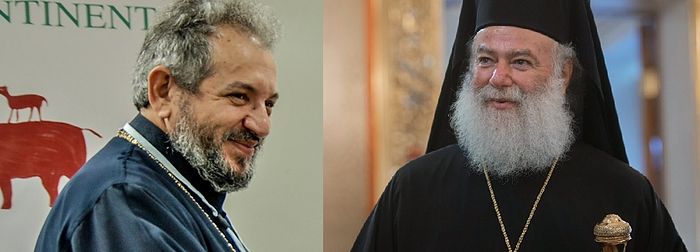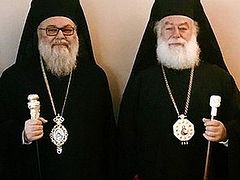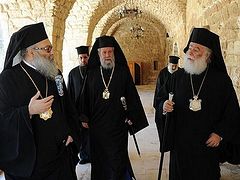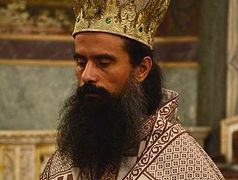Alexandria, June 17, 2019
 Met. Seraphim (left), Pat. Theodoros (left). Photo: ARC, RIA-Novosti
Met. Seraphim (left), Pat. Theodoros (left). Photo: ARC, RIA-Novosti
While the stance of His Beatitude Patriarch Theodoros II of Alexandria and All Africa in support of the canonical Ukrainian Orthodox Church led by His Beatitude Metropolitan Onuphry of Kiev and All Ukraine and the territorial integrity of the Russian Orthodox Church has long been known, the Holy Synod of the Patriarchate has made no official pronouncements on the matter.
The Ukrainian crisis was on the Synod’s agenda at its November session, though the meetings came and went and nothing was stated publicly about Ukraine, likely indicating that the Synod was divided on the issue.
However, in recent articles published by the Greek outlet Romfea, Pat. Theodoros and another hierarch of the Alexandrian Church, His Eminence Metropolitan Seraphim of Zimbabwe and Angola, have both spoken about the need for the crisis to be resolved conciliarly, uniting their voices to the pan-Orthodox chorus that has called for the Patriarchate of Constantinople to work together with its fraternal Local Churches to address the Ukrainian issue.
In his interview, Pat. Theodoros notes that he loves and has known Patriarch Bartholomew for many years, but also that he knows the pain of the schisms in Ukraine firsthand, having lived and served in Odessa for a decade. He also notes his Patriarchate’s close historical and present ties with the Russian Orthodox Church: “The ties between the Alexandrian Patriarchate and the Russian Church are great and it is impossible to break them.”
However, the Church is currently facing a “terrible problem,” Pat. Theodoros affirms. While he believes Pat. Bartholomew had the right to grant autocephaly, that any Church has the right, in principle, to receive autocephaly, “these people who received autocephaly are what divides the Church,” the Patriarch further affirms, noting that “Patriarch” Philaret is now working to further divide the Ukrainian schismatic church.
That is why, Pat. Theodoros continues, he, together with His Beatitude Patriarch John X of Antioch and His Beatitude Patriarch Theophilos III of Jerusalem, implored His Beatitude Archbishop Chrysostomos of Cyprus, with whom they met in Cyprus in April, to meet with Pat. Bartholomew to ask him to meet with His Holiness Patriarch Kirill of Moscow to seek a solution to the ongoing crisis.
“Then we, all the primates, will arrange an informal meeting so the decision that will be made will be approved by all. We live in difficult times and cannot allow ourselves the luxury of being separated,” Pat. Theodoros said, also noting that the primates of the four ancient Churches will meet again soon.
“I believe there is a solution to the problem. We should all just put our personal interests aside and think about the good of the Church,” the Patriarch concluded.
Met. Seraphim of Zimbabwe put forth similar ideas in his article, “The Issue of Ukraine and the Conciliar Institution,” published on Romfea, and in English translation by Orthodox Synaxis.
He begins by noting three major political centers that influenced world history: Rome, Byzantium, and the great European powers and Tsarist Russia.
“When individuals who, consciously or unconsciously believe that they are the continuation of the Roman Emperor, the Byzantine Emperor, or the Russian Tsar affect the life of the Church, then problems are created in the humble ministry of the Church and so secular elements of secular power enter inside and rifts that threaten visible unity are created,” Met. Seraphim writes.
Humility and love lead to unity, he writes, but “Where our visible unity is absent, our partaking in Christ’s life is also absent to a greater or lesser extent.”
Further, those who now threaten the unity of the Church could have strengthened it, but did not do so, fearing to speak so clearly, as did His Beatitude Archbishop Anastasios of Albania and His Eminence Metropolitan Kallistos (Ware), Met. Seraphim believes.
Anything that does not serve for the unity of the Church “is from the evil one,” Met. Seraphim states forcefully.
The Alexandrian hierarch then draws an interesting parallel between the council of Crete in 2016 and the current crisis. While Constantinople largely blames the Russian Church for the non-participation of four Local Churches in the council, Met. Seraphim says responsibility first lies with the Jerusalem and Antiochian Patriarchates (which are out of communion with one another), but also with the Patriarch of Constantinople and the other primates for not doing enough to convince those absent Churches to participate.
Likewise, in the present case, history will consider the Patriarchates of Constantinople and Russia to be responsible for threatening Church unity, but “especially the Protos [Patriarch of Constantinople—O.C.] and his Holy Brothers the Primates who failed to persuade the First among them that there should be a prior understanding between the Phanar and Moscow on the issue of Ukraine,” which would then allow a conciliar solution to be found with the involvement of all the Churches.
“Anything else is from the evil one and our departure from the canonical functioning of the Conciliar Institution of the Church. We must start again from where we left off, at the meeting in Geneva in 2016 where all the Local Orthodox Churches participated with unity and love,” Met. Seraphim writes.
Voices from throughout the Church have repeatedly called on Constantinople to work together with the Russian Church and the other Local Churches, both before and after the “unification council” in December and the granting of autocephaly to the schismatics in January, but Constantinople has repeatedly refused to do so, insisting that it can act wholly unilaterally.
The Alexandrian hierarch further notes that the majority of the Local Churches have proposed the convening of a Synaxis of the primates, which should be preceded by reconciliation between Constantinople and Moscow, as Abp. Anastasios of Albania earlier wrote.
He ends by noting the possible mediatory role of the Patriarch of Alexandria as “Judge of the Oecumene” in bringing the Patriarchs of Moscow and Constantinople together, “so that they may offer us a solution that will then be ratified by the synaxis of the Primates that will be called by the Protos.”
During his visit to Ukraine in September and October, Pat. Theodoros pledged to speak to the primates of all the Local Orthodox Churches to tell them the truth about what he has seen and experienced firsthand in Ukraine, and his desire to serve as mediator between the Patriarchs of Moscow and Constantinople has been spoken of earlier as well.
Follow us on Facebook!



